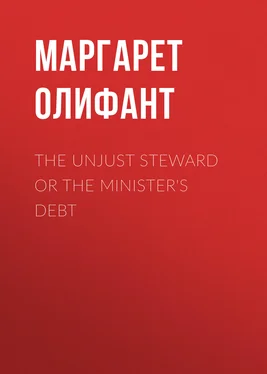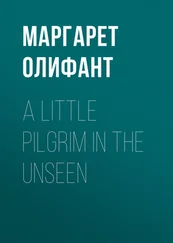Маргарет Олифант - The Unjust Steward or The Minister's Debt
Здесь есть возможность читать онлайн «Маргарет Олифант - The Unjust Steward or The Minister's Debt» — ознакомительный отрывок электронной книги совершенно бесплатно, а после прочтения отрывка купить полную версию. В некоторых случаях можно слушать аудио, скачать через торрент в формате fb2 и присутствует краткое содержание. Издательство: Иностранный паблик, Жанр: foreign_prose, literature_19, foreign_antique, на английском языке. Описание произведения, (предисловие) а так же отзывы посетителей доступны на портале библиотеки ЛибКат.
- Название:The Unjust Steward or The Minister's Debt
- Автор:
- Издательство:Иностранный паблик
- Жанр:
- Год:неизвестен
- ISBN:нет данных
- Рейтинг книги:3 / 5. Голосов: 1
-
Избранное:Добавить в избранное
- Отзывы:
-
Ваша оценка:
- 60
- 1
- 2
- 3
- 4
- 5
The Unjust Steward or The Minister's Debt: краткое содержание, описание и аннотация
Предлагаем к чтению аннотацию, описание, краткое содержание или предисловие (зависит от того, что написал сам автор книги «The Unjust Steward or The Minister's Debt»). Если вы не нашли необходимую информацию о книге — напишите в комментариях, мы постараемся отыскать её.
The Unjust Steward or The Minister's Debt — читать онлайн ознакомительный отрывок
Ниже представлен текст книги, разбитый по страницам. Система сохранения места последней прочитанной страницы, позволяет с удобством читать онлайн бесплатно книгу «The Unjust Steward or The Minister's Debt», без необходимости каждый раз заново искать на чём Вы остановились. Поставьте закладку, и сможете в любой момент перейти на страницу, на которой закончили чтение.
Интервал:
Закладка:
When Mr. Buchanan set out one black morning on the dreadful enterprise of borrowing money, his heart was very sore, and his countenance clouded. He was a man of a smiling countenance on ordinary occasions. He looked now as if disgrace had overtaken him, and nothing but despair was before him. It was not that he had an evil opinion of human nature. He had, perhaps, notwithstanding what it is now the fashion to call his Calvinistic creed, almost too good an opinion of human nature. It has pleased the literary class in all times, to stigmatise the Calvinistic creed as the origin of all evil. I, for one, am bound to say that I have not found it to be so, perhaps because dogmatical tenets hold, after all, but a small place in human hearts, and that the milk of human kindness flows independent of all the formal rules of theology. Mr. Buchanan was no doubt a Calvinist, and set his hand unhesitatingly to all the standards. But he was a man who was for ever finding out the image of God in his fellow men, and cursing was neither on his lips nor in his heart. He did not religiously doubt his fellow creature or condemn him. The tremour, the almost despair, the confusion of face with which he set out to borrow money was not because of any dark judgment on other men. It was the growth of that true sense of honour, exaggerated till it became almost a defect, which his Scotch traditions and his narrow means combined to foster in him. An honourable rich man may borrow without scruple, for there is no reason in his mind why he should not pay. But to an honourable poor man it is the thing most dreadful in the world, for he knows all the difficulties, the almost impossibility of paying, the chance of being exposed to the world in his inmost concerns, the horror of ruin and a roup, the chance of injuring another man, and dying under the shame of indebtedness, all these miseries were in Mr. Buchanan’s mind when he went out on his terrible mission. He would rather have marched through a shower of bullets, or risked his life in any other way.
He went to old Mr. Anderson, who had been the head of the bank, and who was still believed to be the highest authority in any kind of financial matter. He had retired from the bank, and from all active business several years before. He was an elder of the church; and from the beginning of Mr. Buchanan’s incumbency had been one of his greatest admirers and friends. He was, besides all this, a wealthy old man, and had no children nor any near relative to come after him. It was not, however, with any thought of the latter circumstance, or indeed expectation of actual help from himself that the minister sought this old gentleman. He thought of the bank, which, according to Scottish methods, gives advantages to struggling people, and intended only to ask Mr. Anderson’s advice as to what should be done, perhaps if emboldened by his manner to ask him to be his surety, though the thought of making such a request to any man bathed the minister in a cold dew of mental anguish. Had he been asked by any other poor man what reception such an application would have received from Mr. Anderson, he would have bidden that other take courage.
“He is the kindest man in the world,” he would have said. But when it came to be his own case the minister’s heart sank within him. He could not have been more miserable had his old friend, instead of being the kindest, been the most cold-hearted man in the world.
There is, perhaps, no more wonderful sensation in life, than that complete and extraordinary relief which seems to fill the heart with a sudden flood of undreamed of ease and lightness, when a hand is held out to us all at once in our trouble, and the help which we have not believed possible, comes. Mr. Buchanan could not believe his ears when the old banker’s first words fell upon him.
“Possible! oh, yes, more than possible; how could you doubt it?” he said. The poor man felt himself float off those poor feet that had plodded along the street so heavily, into an atmosphere of ease, of peace, of consolation unspeakable. The thing could be done. Instead of bringing a cold shade over his friend’s face, it brought a light of kindness, even of pleasure. Yes, of pleasure, pleasure in being trusted, in being the first to whom recourse was made, in being able to give at once relief. It was so great a gleam of that sunshine which sometimes comes out of a human face, brighter than the very sun in the firmament, that poor Buchanan was dazzled, and for the moment made to think better even of himself as calling forth such friendship and kindness. A glow came into his heart, not only of gratitude but of approval. To see a man do what in one circumstance is the highest and noblest thing to do, to feel him exceed all our expectations, and play the part almost of a beneficent God to misfortune, what more delightful spectacle is there, even if it had nothing to do with ourselves. Mr. Buchanan poured forth all his soul to his old friend, who understood everything at half a word, and only hesitated to think which would be the best way of fulfilling his wishes. It was by old Anderson’s advice at last that the idea of the bank was abandoned. He decided that it would be better to lend the money to the minister himself.
“We will have no fixed times or seasons,” he said. “You shall pay me just as you can, as you are able to put by a little, and we’ll have no signing of papers. You and me can trust each other; if I die before you, as naturally I will, you’ll make it up to my heirs. If you, which God forbid, should die before me, there will be no use of paper to trouble your wife. It’s just between you and me, nobody has any business to make or mell in the matter. I have no fine laddie to put out in the world, the more’s the pity; and you have, and a bonnie lassie too, I wish you joy of them both. We’ll just say nothing about it, my dear sir, just a shake of the hand, and that’s all there’s needed between you and me.”
“But, Mr. Anderson, how can I accept this? You must let me give you an acknowledgment. And then the interest–”
“Toots,” said the old man, “interest! what’s fifteen pounds to me? I hope I can live and enjoy myself without your fifteen pounds. Nonsense, minister! are you too proud to accept a kindly service, most kindly offered and from the heart, from an old man, that you have done both good and pleasure to many a day?”
“Oh, proud, no, not proud,” cried Buchanan, “unless it were proud of you, old friend, that have the heart to do such a blessed thing.”
“Hoot,” said the old man, “it’s nothing but filthy siller, as your good wife says.”
This had been the bargain, and it was a bargain which probably gave more pleasure to the lender than to the borrower. It redoubled the old gentleman’s interest in the family, and indeed made him take a personal share in their concerns, which pricked the parents a little, as if he felt a certain right to know all about Willie’s outfit and Marion’s plenishing. He gave his advice about the boy’s boxes, and his gun, and kindly criticised his clothes, and warned them not to pay too much for boots and shoes, and other outside articles, pressing certain makers upon them with almost too warm a recommendation. And he liked to see Marion’s sheets and her napery, and thought the damask tablecloths almost too fine for a country manse, where, except on a presbytery meeting or the Monday’s dinner after a sacramental occasion, there would be no means of showing them. But all this was very harmless, though it sometimes fretted the recipients of his bounty, who could not explain to their children the sudden access of interest on the part of old Anderson in all their concerns.
And now to think, while the first year had not more than passed, when William’s outfit had just been paid off to the utmost farthing, and Marion’s bill for her napery and her stock of personal linen, that the old man should die! I judge from Mr. Anderson’s reference to fifteen pounds (five per cent. being the usual interest in those days, though I am told it is much less now), that the sum that Mr. Buchanan had borrowed was three hundred pounds, for I presume he had certain urgent bills to provide for as well as Willie and May. Fifty pounds was still in the bank, which was a reserve fund for Marion’s gowns and her wedding expenses, etc. And to think that just at that moment, when as yet there had not been time to lay up a penny towards the repayment of the loan, that this whole house of cards, and their comfort and content in the smoothing away of their difficulties should, in a moment, topple about their ears! There seemed even some reason for the tone of exasperation which came into Mrs. Buchanan’s voice in spite of herself. Had he done it on purpose it could scarcely have been worse. And indeed it looked as if it had been done on purpose to drop them into deeper and deeper mire.
Читать дальшеИнтервал:
Закладка:
Похожие книги на «The Unjust Steward or The Minister's Debt»
Представляем Вашему вниманию похожие книги на «The Unjust Steward or The Minister's Debt» списком для выбора. Мы отобрали схожую по названию и смыслу литературу в надежде предоставить читателям больше вариантов отыскать новые, интересные, ещё непрочитанные произведения.
Обсуждение, отзывы о книге «The Unjust Steward or The Minister's Debt» и просто собственные мнения читателей. Оставьте ваши комментарии, напишите, что Вы думаете о произведении, его смысле или главных героях. Укажите что конкретно понравилось, а что нет, и почему Вы так считаете.












